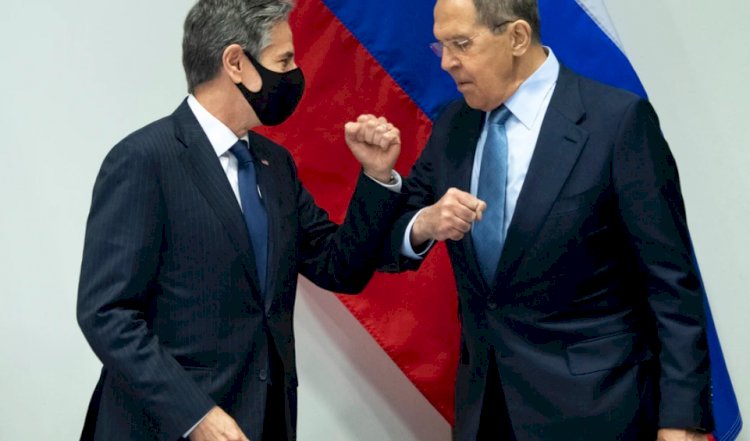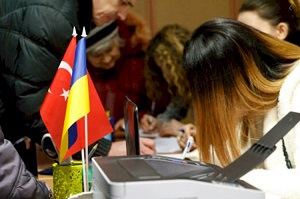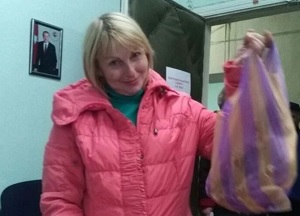Top US, Russian Diplomats Meet Face-to-Face at Arctic Summit
On the sidelines of the Arctic Council gathering, the big focus Wednesday was on a meeting between Blinken and Lavrov.

Top US, Russian Diplomats Meet Face-to-Face at Arctic Summit
Climate change and cooperation among Arctic states are among the topics of discussion Thursday in Reykjavik, Iceland, as the Arctic Council holds a ministerial meeting.
“We value our strong international cooperation through the Council to address the climate crisis and keep the Arctic region peaceful,” U.S. Secretary of State Antony Blinken said ahead of Thursday’s talks.
Earlier in the week, Blinken urged the global community to avoid militarizing the Arctic, and said Russia has advanced “unlawful maritime claims” in the region.
Russian Foreign Minister Sergey Lavrov said this week that Western countries should not claim rights to the Arctic, and that Russia is responsible for ensuring its Arctic coast is safe.
The Arctic dispute is over the so-called Northern Sea Route, a shipping lane that runs through Russia’s northern coast in the Arctic. Russia considers the Northern Sea Route vital to its economic and military interests and requires foreign vessels to obtain permission from Moscow to navigate it. The United States has dismissed Russia’s claims of jurisdiction over parts of the route as illegitimate.
Russia is taking over the chairmanship of the Arctic Council, and has set goals for highlighting sustainable economic development and promoting Indigenous cultures and languages.
On the sidelines of the Arctic Council gathering, the big focus Wednesday was on a meeting between Blinken and Lavrov.
Blinken said the United States is ready to work with Russia to advance areas where the two nations have "intersecting interests," while continuing to defend U.S. interests and respond if Moscow acts aggressively against Washington and its allies.
"There are many areas where our interests intersect and overlap, and we believe that we can work together and indeed build on those interests — whether it is dealing with COVID-19 and the pandemic, combating climate change, dealing with the nuclear programs" in Iran and North Korea, as well as the peace process in Afghanistan, Blinken said Wednesday.
"Our position is clear: We are prepared to discuss all issues on the table with an understanding that our discussions would be honest, factual and with mutual respect," Lavrov said, adding he is ready to discuss "the Russian (diplomatic) missions in the U.S. and the U.S. missions in Russia."
It was the first face-to-face meeting for the top U.S. and Russian diplomats and comes at a time of heightened tension between their countries. The meeting also set the stage for a planned summit next month between U.S. President Joe Biden and Russian President Vladimir Putin.
The meeting between Blinken and Lavrov lasted about an hour and 45 minutes, said to be longer than expected.
“The Secretary made clear that Russia should release American citizens Paul Whelan and Trevor Reed so they can return home to their families,” State Department spokesperson Ned Price said in a statement, adding that Blinken also raised “deep concerns” over Russia’s continued military deployments in and near Ukraine, and the health of jailed Russian opposition leader Alexey Navalny and the repression of opposition organizations.
European energy security is at the top of the U.S. agenda as Russia's controversial Nord Stream 2 gas pipeline, which connects Russia and Germany, nears completion.
Wednesday, the State Department announced its plan to sanction Russian vessels and entities involved in the building of Nord Stream 2.
But the U.S. is waiving sanctions on the company in charge of the project, Nord Stream 2 AG, and CEO Matthias Warnig, a German national, citing U.S. national interest.
The move is seen as a bid to improve relations with Germany. The Biden administration has been seeking to strengthen U.S.-German bonds and the transatlantic relationship.
"I think our actions today have demonstrated that we continue to oppose the pipeline projects but that we also are cognizant of the president's commitment to rebuild relations with our European allies and partners," a senior U.S. official said.
German Foreign Minister Heiko Maas praised the decision.
"We see this as a constructive step which we are happy to further discuss with our partners in Washington," he said Wednesday during a press conference.
Russia has previously defended the project as economically feasible.
The U.S. has been warning about the security risks of Russian energy export pipelines, in particular Nord Stream 2. U.S. officials said if they were completed, those projects would undermine European security and strengthen Russia's ability to use its energy resources to coerce the United States' European partners and allies.
Russian officials said Wednesday the latest U.S. decision to waive sanctions would normalize ties between Moscow and Washington.
Donald Jensen, director for Russia and strategic stability at the U.S. Institute of Peace, said he does not believe the State Department’s announcement to waive sanctions on Nord Stream 2 AG and its CEO “was taken primarily with an eye toward improving the atmosphere around the Blinken-Lavrov meeting.”
“I expect that the U.S. administration still intends to take a tough line on Russia’s threatening behavior toward Ukraine, interference in our elections and other areas,” Jensen said. “Nevertheless, the favorable reaction in Moscow to the decision suggests the Kremlin sees the pipeline decision as a concession which it will hope to repeat in other areas.”
voa news







































